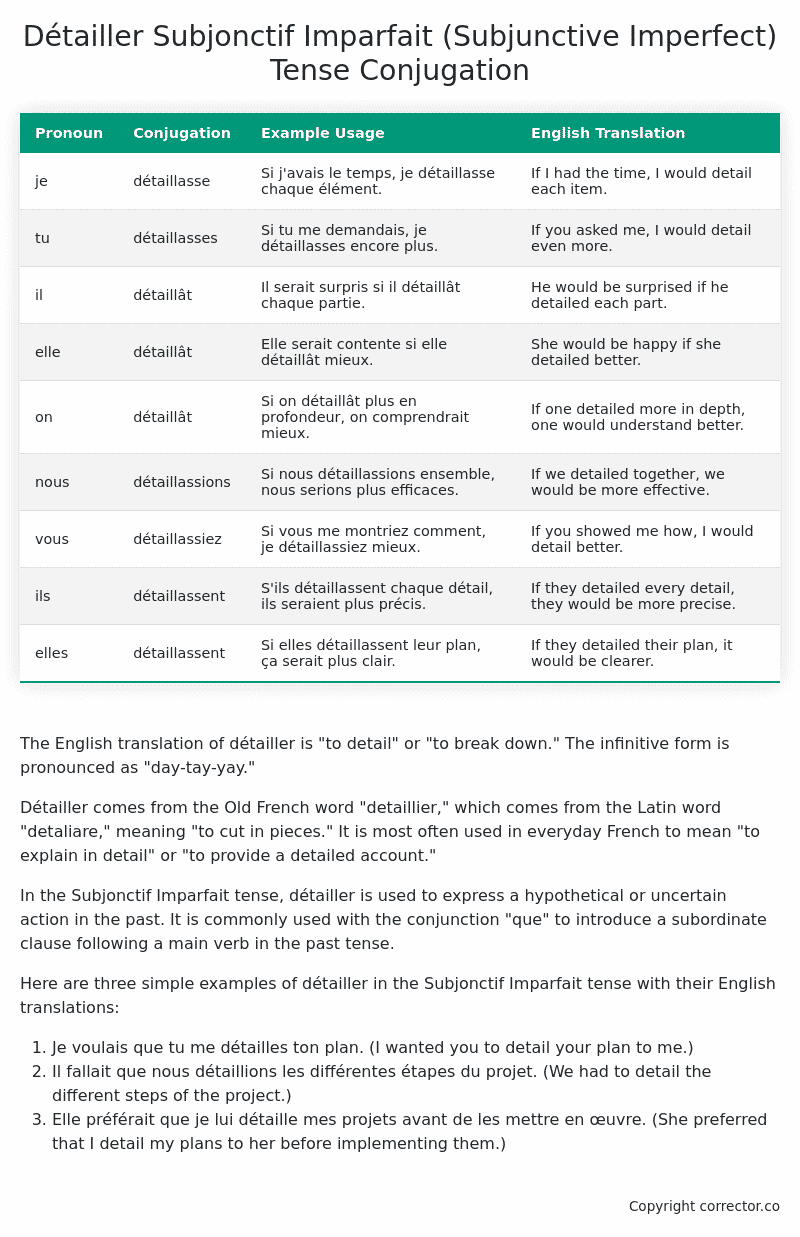Subjonctif Imparfait (Subjunctive Imperfect) Tense Conjugation of the French Verb détailler
Introduction to the verb détailler
The English translation of détailler is “to detail” or “to break down.” The infinitive form is pronounced as “day-tay-yay.”
Détailler comes from the Old French word “detaillier,” which comes from the Latin word “detaliare,” meaning “to cut in pieces.” It is most often used in everyday French to mean “to explain in detail” or “to provide a detailed account.”
In the Subjonctif Imparfait tense, détailler is used to express a hypothetical or uncertain action in the past. It is commonly used with the conjunction “que” to introduce a subordinate clause following a main verb in the past tense.
Here are three simple examples of détailler in the Subjonctif Imparfait tense with their English translations:
- Je voulais que tu me détailles ton plan. (I wanted you to detail your plan to me.)
- Il fallait que nous détaillions les différentes étapes du projet. (We had to detail the different steps of the project.)
- Elle préférait que je lui détaille mes projets avant de les mettre en œuvre. (She preferred that I detail my plans to her before implementing them.)
Table of the Subjonctif Imparfait (Subjunctive Imperfect) Tense Conjugation of détailler
| Pronoun | Conjugation | Example Usage | English Translation |
|---|---|---|---|
| je | détaillasse | Si j’avais le temps, je détaillasse chaque élément. | If I had the time, I would detail each item. |
| tu | détaillasses | Si tu me demandais, je détaillasses encore plus. | If you asked me, I would detail even more. |
| il | détaillât | Il serait surpris si il détaillât chaque partie. | He would be surprised if he detailed each part. |
| elle | détaillât | Elle serait contente si elle détaillât mieux. | She would be happy if she detailed better. |
| on | détaillât | Si on détaillât plus en profondeur, on comprendrait mieux. | If one detailed more in depth, one would understand better. |
| nous | détaillassions | Si nous détaillassions ensemble, nous serions plus efficaces. | If we detailed together, we would be more effective. |
| vous | détaillassiez | Si vous me montriez comment, je détaillassiez mieux. | If you showed me how, I would detail better. |
| ils | détaillassent | S’ils détaillassent chaque détail, ils seraient plus précis. | If they detailed every detail, they would be more precise. |
| elles | détaillassent | Si elles détaillassent leur plan, ça serait plus clair. | If they detailed their plan, it would be clearer. |
Other Conjugations for Détailler.
Le Present (Present Tense) Conjugation of the French Verb détailler
Imparfait (Imperfect) Tense Conjugation of the French Verb détailler
Passé Simple (Simple Past) Tense Conjugation of the French Verb détailler
Passé Composé (Present Perfect) Tense Conjugation of the French Verb détailler
Futur Simple (Simple Future) Tense Conjugation of the French Verb détailler
Futur Proche (Near Future) Tense Conjugation of the French Verb détailler
Plus-que-parfait (Pluperfect) Tense Conjugation of the French Verb détailler
Passé Antérieur (Past Anterior) Tense Conjugation of the French Verb détailler
Futur Antérieur (Future Anterior) Tense Conjugation of the French Verb détailler
Subjonctif Présent (Subjunctive Present) Tense Conjugation of the French Verb détailler
Subjonctif Passé (Subjunctive Past) Tense Conjugation of the French Verb détailler
Subjonctif Imparfait (Subjunctive Imperfect) Tense Conjugation of the French Verb détailler (this article)
Subjonctif Plus-que-parfait (Subjunctive Pluperfect) Tense Conjugation of the French Verb détailler
Conditionnel Présent (Conditional Present) Tense Conjugation of the French Verb détailler
Conditionnel Passé (Conditional Past) Tense Conjugation of the French Verb détailler
L’impératif Présent (Imperative Present) Tense Conjugation of the French Verb détailler
L’infinitif Présent (Infinitive Present) Tense Conjugation of the French Verb détailler
Struggling with French verbs or the language in general? Why not use our free French Grammar Checker – no registration required!
Get a FREE Download Study Sheet of this Conjugation 🔥
Simply right click the image below, click “save image” and get your free reference for the détailler Subjonctif Imparfait tense conjugation!

Détailler – About the French Subjonctif Imparfait (Subjunctive Imperfect) Tense
Formation
Common Everyday Usage Patterns
Interactions with Other Tenses
Subjonctif Présent
Indicatif Passé Composé
Conditional
Conditional Perfect
Summary
I hope you enjoyed this article on the verb détailler. Still in a learning mood? Check out another TOTALLY random French verb conjugation!


